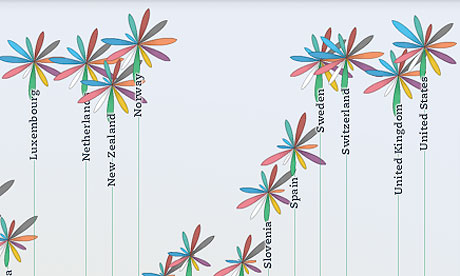
For an indicator we have to use all the time, GDP has very few friends. The idea of a single number to show a country's economic power came from US Nobel-prize winning economist Simon Kuznets - and that's what GDP is, a measure of economic output.
What GDP misses is, arguably, more important than what it includes. Robert Kennedy argued that
the gross national product does not allow for the health of our children, the quality of their education or the joy of their play. It does not include the beauty of our poetry or the strength of our marriages, the intelligence of our public debate or the integrity of our public officials. It measures neither our wit nor our courage, neither our wisdom nor our learning, neither our compassion nor our devotion to our country, it measures everything in short, except that which makes life worthwhile
Even Kuznets agreed that "the welfare of a nation can scarcely be inferred from a measure of national income".
This government - like many others - is keen to find new ways to compare nations, which is the motivation behind the moves to measure happiness and life satisfaction - and you can read more about these here.
The Organisation for Economic Cooperation and Development - OECD - has been trying a new approach: asking people what they think is important, via its Better Life Index.
The Index, launched a year ago, puts you in charge by allowing you to choose what matters to you - and how highly it should be ranked. Today it gets relaunched.
It's counted as a major success by the OECD, particularly as users consistently rank quality of life indicators such as education, environment, governance, health, life satisfaction, safety and work-life balance above more traditional ones. Designed by Moritz Stefaner and Raureif, it's also rather beautiful.
The top five countries in number of visitors are the United States (20%), France (8%), Canada (7%), Germany (6%) and the United Kingdom (6%). The BLI is now available in French. Translation is driven by usage statistics, thus German and Spanish are likely to be next languages given the number of users from German and Spanish-speaking countries.
One of the major criticisms of the index was that it didn't include inequality - and that's changing with the relaunch with new indicators on inequality and gender plus rankings for Brazil and Russia. A couple have been removed too: Governance has been renamed civic engagement, employment rate of women with children has been replaced by the full integration of gender information in the employment data and students' cognitive skills (e.g. student skills in reading, math and sciences) has replaced students' reading skills to have a broader view.
The OECD have built lots of apps off the back of the index, including this one, which offers real-time data as people fill it in.
The countries that consistently come top in users rankings (with 2012 place in brackets) are Denmark (life satisfaction and work-life balance), Switzerland (health and jobs), Finland (education), Japan (safety), Sweden (environment), and the USA (income).
The OECD has also given us the raw data behind the Better Life index too - check out this interactive to see how countries compare on everything from Housing to Employment. Download the data for yourself and let us know what you can do with it.
• Full disclosure: I am moderating at the OECD Forum today
Download the data
• DATA: download the full spreadsheet
NEW! Buy our book
• Facts are Sacred: the power of data (on Kindle)
More open data
Data journalism and data visualisations from the Guardian
World government data
• Search the world's government data with our gateway
Development and aid data
• Search the world's global development data with our gateway
Can you do something with this data?
• Flickr Please post your visualisations and mash-ups on our Flickr group
• Contact us at data@guardian.co.uk
• Get the A-Z of data
• More at the Datastore directory
• Follow us on Twitter
• Like us on Facebook

